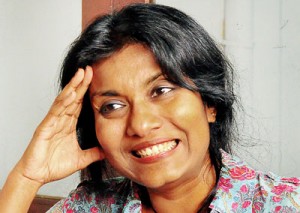Words for thought
Manuka Wijesinghe is in good spirits – despite the fact that she chose to keep the launch of her latest book low key. Though it is the third in the trilogy to appear, ‘Sinhala Only’ actually falls somewhere between ‘Monsoons and Potholes’ and ‘Theravada Man.’ With it Wijesinghe ventures into many a literary minefield, tackling among other subjects ‘Tamil and Sinhalese Terrorism’, ‘why Ceylon went wrong and why India is going right’ and the diversity of this island nation which the author believes is under threat.

Pic by Mangala Weerasekera
“I basically wrote this book as a last hope that it will force people to think. I am not saying what I have written is correct, I am saying ‘think about your position,’” she tells the Sunday Times. If she’s been brave with her content, so too with format. Here she leaves behind a smooth narrative in favour of a style that she says is more adventurous – something that plays on media coverage and theatre practice, featuring a dizzying array of characters. “One thing I can do well because of my theatre training is write dialogue,” she says, explaining that it arises from knowing her characters intimately.
Though something of a nomad, when in Sri Lanka, Wijesinghe always connects with her old friends from the theatre. In the book’s acknowledgement she pays tribute to them and says she has given her characters their surnames. However, it is her father’s generation she expects will find most to relate to in this novel – in part because it deals with the politics of that time. Growing up, she was exposed to a lot of talk about the state of affairs in the country, and now acknowledges that it’s in her blood. It’s this knowledge she mines to convey what she identifies as the book’s main message – “diversity is actually the strength of this country.”
Lamenting Sri Lanka’s ongoing “cultural deterioration” she says the book has its own rhythm, a very “staccato beat.” “It’s easier reading than the other two,” she says, adding that she enjoyed her editor’s description of the novel as a ‘wonderful post-modern book.’ Each of her novels has presented its own challenge, but Wijesinghe says she tries to change her style from book to book. Even within the book, she tries to vary her pace, allowing herself time to follow her passions, whether it’s exploring the Dravidian roots of Sinhala or the path the Mahaweli takes. “There are a lot of little connections, this book requires thought (from the reader),” she says.
Wijesinghe continues to be inspired by Sri Lanka, but is unable to actually write here: “I enjoy life here too much. I collect all the information here, and I write elsewhere.” (In the case of ‘Sinhala Only’ that turned out to be Germany and Italy.) However, she returned home to find a publisher and then ended up doing an informal launch at a literary festival in Bali earlier this year. She’s come under some pressure to shorten the book to a more manageable 200 pages, but Wijesinghe is more determined than ever to school her readers in “the art of reading long books.”
Looking at it now, she says, “I tried to keep it light. Humour is a way to confront things for me.” She’s curious now to know what her fans will make of the novel. “Almost everyone who loved ‘Monsoons’ hated ‘Theravada Man,’ she says, “this is a little bit of both.” In the meantime, talks are already underway to publish a German translation of ‘Sinhala Only’ – for Wijesinghe who knows the language, the challenge will be in finding a good translator. As she readied to return to Germany to celebrate her daughter’s graduation, she was leaving behind copies of ‘Sinhala Only’ in local bookstores. Now that she’s managed to get it published, she’s content to let fans make of it what they will.
Priced at Rs. 1350, ‘Sinhala Only’ is a VijithaYapa Publications and is available at bookstores.


